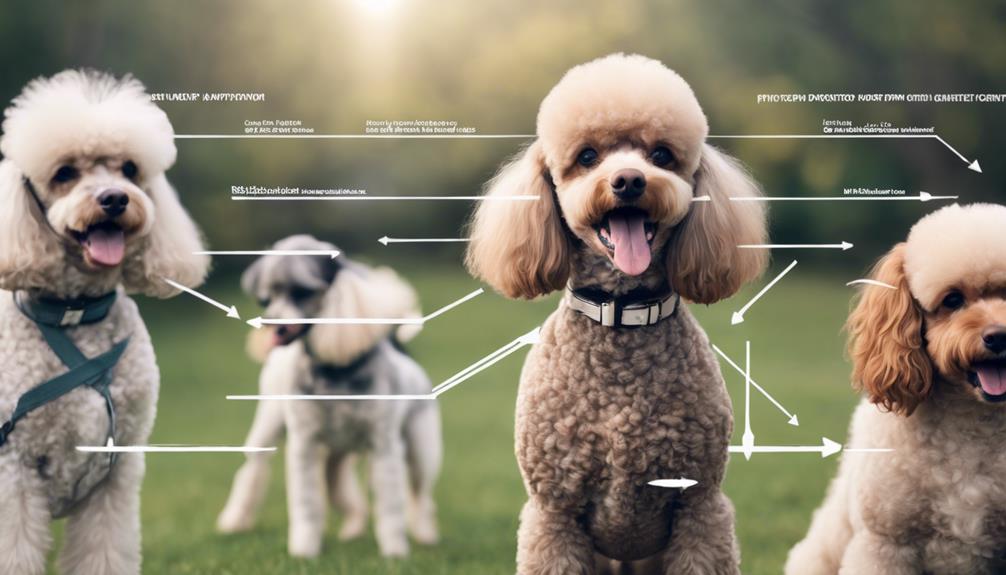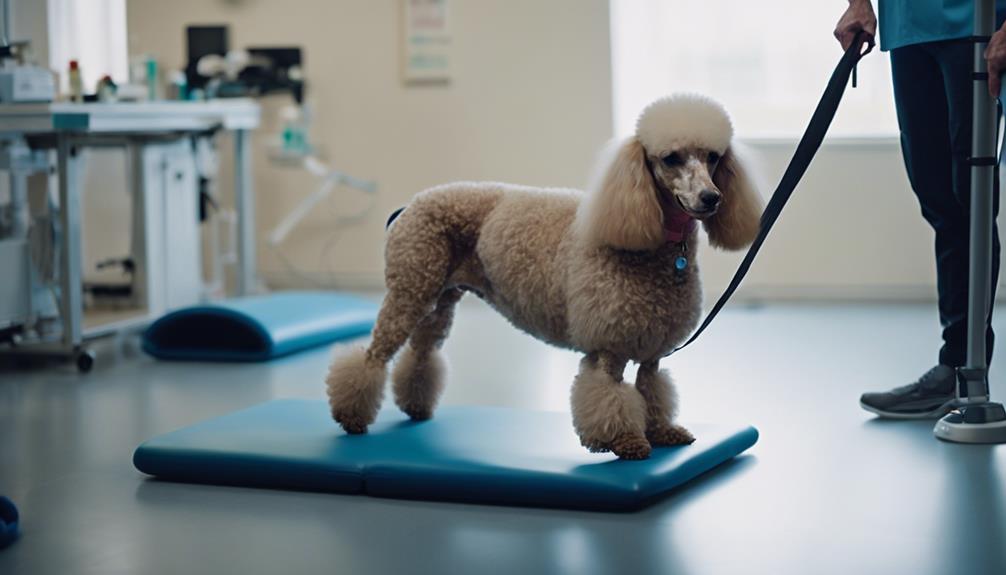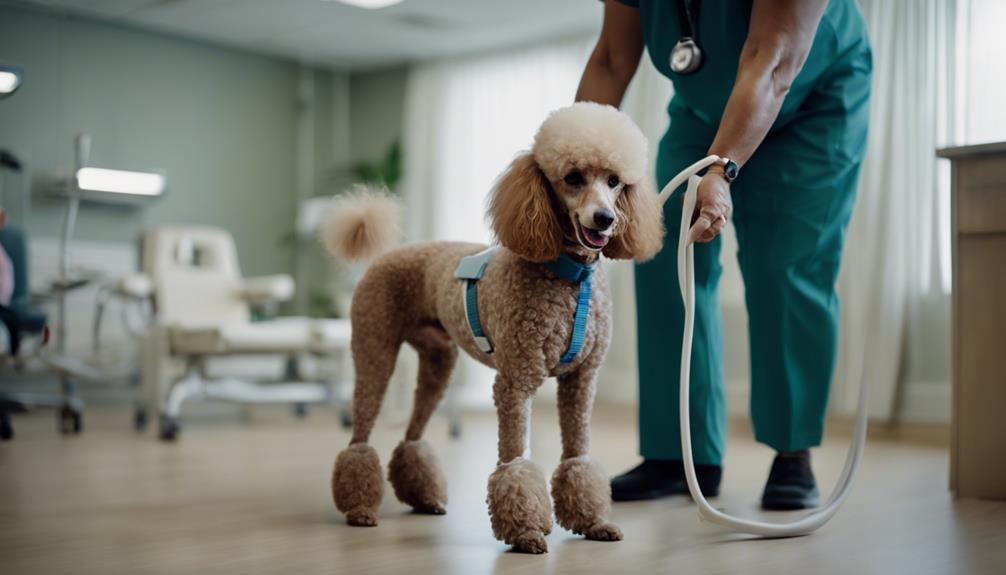Are you aware of the impact hip dysplasia can have on your Poodle's quality of life? Understanding how to prevent and care for this condition is crucial for your furry friend's well-being. By implementing specific strategies and interventions, you can help manage hip dysplasia effectively and ensure your Poodle leads a comfortable and active life.
Key Takeaways
- Genetic testing and responsible breeding practices are essential for preventing hip dysplasia in Poodles.
- Balanced diet, controlled exercise, and weight management are crucial for managing genetic predisposition.
- Early detection through regular veterinary screenings allows for proactive intervention and management strategies.
- Treatment options like surgery, medications, physical therapy, and joint supplements can improve quality of life for Poodles with hip dysplasia.
Genetic Factors in Poodle Hip Dysplasia

Poodles inherit a genetic predisposition to hip dysplasia, a condition that varies in prevalence among different sizes of the breed, with Miniature and Toy Poodles showing lower incidence rates compared to Standard Poodles. Genetic testing is crucial in identifying carriers of the hip dysplasia gene in Poodles. Responsible breeding practices entail screening for hip dysplasia to make informed decisions and decrease the condition's occurrence within the breed. Factors such as diet, exercise, and weight management play a pivotal role in managing the genetic predisposition to hip dysplasia in Poodles. Regular vet check-ups are essential for monitoring and early intervention to address hip dysplasia promptly, ensuring the well-being and quality of life for Poodles. By integrating genetic testing, responsible breeding practices, proper screening, maintaining a balanced diet, regular exercise, weight management, and consistent veterinary care, you can effectively manage hip dysplasia in Poodles and provide them with a healthy and fulfilling life.
Diet and Exercise Recommendations

To effectively support your Poodle's joint health and minimize the risk of hip dysplasia, ensuring a balanced diet and incorporating controlled exercise routines are essential components to consider. Poodles should be fed a balanced diet rich in high-quality protein and essential nutrients to prevent obesity, a risk factor for hip dysplasia. Controlled exercise, such as gentle activities like walking and swimming, can strengthen the muscles around the hip joint, reducing the likelihood of hip dysplasia. It's important to avoid overfeeding or excessive treats to prevent rapid growth, as maintaining a healthy weight and proper growth rate are crucial for hip dysplasia prevention in Poodles. Additionally, providing joint supplements like glucosamine and chondroitin can support hip health, particularly as Poodles age, promoting joint lubrication and mobility. Regular veterinary check-ups are vital for monitoring weight, joint health, and overall well-being, facilitating early detection and management of any hip dysplasia-related issues.
Early Detection and Diagnosis Methods

Early detection and diagnosis methods for hip dysplasia in Poodles involve utilizing hip radiographs to confirm the condition, observing clinical signs like joint laxity and pain, and seeking regular veterinary screenings to ensure timely intervention for improved quality of life. Hip dysplasia can be accurately diagnosed through hip radiographs, providing a clear picture of the hip joint's health. Clinical signs such as joint laxity, where the hip joint moves excessively, and pain during physical activities are crucial indicators of hip dysplasia in Poodles. While genetic testing is still evolving, regular visits to the veterinarian play a significant role in identifying hip dysplasia early on. Veterinarians can conduct thorough physical examinations and recommend diagnostic tests to confirm the condition promptly. Early detection allows for proactive management strategies, which can enhance the well-being of Poodles affected by hip dysplasia. Regular screenings and awareness of clinical signs are fundamental in ensuring the early detection and diagnosis of hip dysplasia in Poodles.
Treatment Options for Poodles

When considering treatment options for hip dysplasia in Poodles, surgical interventions like Total Hip Replacement (THR) or Femoral Head Ostectomy (FHO) may be necessary for long-term relief. These procedures aim to alleviate pain and improve mobility in affected Poodles. Along with surgical interventions, there are several other treatment options to consider:
- Nonsteroidal Anti-Inflammatory Drugs (NSAIDs): These medications are commonly prescribed to manage pain and inflammation associated with hip dysplasia in Poodles.
- Physical Therapy: Incorporating activities like swimming can help enhance muscle strength, flexibility, and overall mobility in Poodles with hip dysplasia.
- Joint Supplements: Providing supplements containing ingredients like glucosamine and chondroitin can support joint health and reduce further degeneration in Poodles with hip dysplasia.
While these conventional treatments are effective, alternative therapies such as acupuncture or Gold Bead Implantation may also be explored for a holistic approach to caring for Poodles with hip dysplasia.
Long-Term Care Strategies

For optimal management of hip dysplasia in Poodles, consistent implementation of long-term care strategies is essential. To prevent hip dysplasia from worsening, it is crucial to establish an exercise routine that focuses on strengthening muscles and improving joint stability in your Poodle. Alongside regular exercise, providing a well-balanced diet will help maintain an optimal weight, reducing strain on the hip joints. Consider incorporating physical therapy or hydrotherapy sessions to enhance mobility and alleviate discomfort in your Poodle. Pain management is also vital; monitor and manage pain levels through medication or supplements to ensure a comfortable and active lifestyle. Creating a warm and comfortable environment with supportive bedding can help alleviate joint pain and stiffness. By focusing on these long-term care strategies, you can effectively support your Poodle in managing hip dysplasia, promoting muscle strengthening and joint stability for a better quality of life.
Frequently Asked Questions
How Do You Prevent Hip Dysplasia in Poodles?
To prevent hip dysplasia in Poodles, focus on diet management, exercise routines, weight control, supplements usage, genetics influence, regular check-ups, and environmental factors. Consider physical therapy, joint health, and surgical options if needed for optimal care.
Can Hip Dysplasia Be Prevented?
Yes, hip dysplasia can be prevented through a combination of exercise routines, dietary supplements, weight management, early detection, genetic testing, joint health, physical therapy, regular vet visits, swimming therapy, and proper nutrition. These strategies can help ensure optimal hip health for your Poodle.
What to Avoid if Your Dog Has Hip Dysplasia?
To ease the discomfort of hip dysplasia in your Poodle, avoid high-impact activities, excessive jumping, rough play, and strenuous exercise. You should also be mindful of obesity risks, maintain a healthy diet, and steer clear of inappropriate supplements, incorrect training methods, and overmedication.
Can You Slow Down Hip Dysplasia in Dogs?
You can slow down hip dysplasia in dogs by focusing on a balanced exercise routine, weight management, joint supplements, swimming therapy, proper nutrition, regular check-ups, physical therapy, orthopedic beds, low-impact activities, and controlled growth. These strategies can help manage hip dysplasia effectively.
Conclusion
In conclusion, preventing and caring for hip dysplasia in Poodles requires genetic screening, proper diet, and exercise. Regular vet check-ups and early detection are key in managing this condition. Are you ready to take the necessary steps to ensure your Poodle's joint health and overall well-being? Stay proactive in your approach to hip dysplasia to provide the best care for your beloved pet.
